 There’s no denying that when you live somewhere like the Emerson area, you need a quality heating system in place. Not only that, but you need to make sure it’s well-maintained. This means scheduling professional tune-ups for your heater each year–twice a year if you’re using a year-round heat pump system. Tune-ups help your heater work as effectively and efficiently as possible for as long as possible. Plus, tune-ups can help prevent up to 85% of the repairs a furnace or heating system may ever need in its lifetime! This is because, during your tune-up, we’ll alert you to small repair needs so you can take care of them before they turn into larger emergencies.
There’s no denying that when you live somewhere like the Emerson area, you need a quality heating system in place. Not only that, but you need to make sure it’s well-maintained. This means scheduling professional tune-ups for your heater each year–twice a year if you’re using a year-round heat pump system. Tune-ups help your heater work as effectively and efficiently as possible for as long as possible. Plus, tune-ups can help prevent up to 85% of the repairs a furnace or heating system may ever need in its lifetime! This is because, during your tune-up, we’ll alert you to small repair needs so you can take care of them before they turn into larger emergencies.
Of course, that doesn’t mean that repair needs will never crop up between maintenance appointments, and it’s important to know the signs of a heater in disrepair so you can get it fixed ASAP. One of these signs is strange noises coming from the system. But, what noises constitute “strange?” Read on to find out!

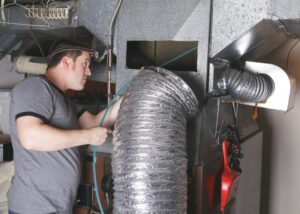 Are you utilizing a gas-powered heating system in your home? Well, then there is at least one safety risk that you really need to know about. Now, this isn’t to say that gas furnaces are automatically dangerous by nature… they aren’t. However, there is a component within your gas-powered system that could be harmful if ignored for too long–and this is the heat exchanger.
Are you utilizing a gas-powered heating system in your home? Well, then there is at least one safety risk that you really need to know about. Now, this isn’t to say that gas furnaces are automatically dangerous by nature… they aren’t. However, there is a component within your gas-powered system that could be harmful if ignored for too long–and this is the heat exchanger.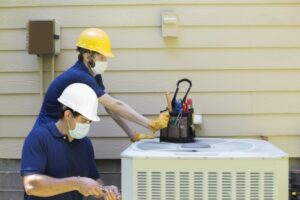 If your air conditioner is showing unusual symptoms, even if it’s running “okay,” it’s probably time to give us a call. What we run into fairly often with residential air conditioning systems is that homeowners wait until the air conditioner breaks down completely to call us. By then, whatever repair need they had likely grew into something unnecessarily expensive to repair. We say unnecessarily because the truth is, most repair needs show symptoms that could be managed far sooner.
If your air conditioner is showing unusual symptoms, even if it’s running “okay,” it’s probably time to give us a call. What we run into fairly often with residential air conditioning systems is that homeowners wait until the air conditioner breaks down completely to call us. By then, whatever repair need they had likely grew into something unnecessarily expensive to repair. We say unnecessarily because the truth is, most repair needs show symptoms that could be managed far sooner.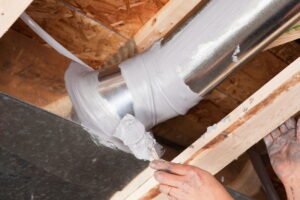 The ductwork attached to HVAC systems is one of those things that homeowners often don’t pay much attention to. After all, they’re out of sight, and therefore out of mind too, until they start to make your energy bills skyrocket.
The ductwork attached to HVAC systems is one of those things that homeowners often don’t pay much attention to. After all, they’re out of sight, and therefore out of mind too, until they start to make your energy bills skyrocket. You’ve been trying to keep the house cool now that things are warming up. Even with your best efforts though and some best practices like an air filter change taken into account, you still can’t get your home comfort where it needs to be. Something is wrong–is it time to say goodbye to your air conditioner?
You’ve been trying to keep the house cool now that things are warming up. Even with your best efforts though and some best practices like an air filter change taken into account, you still can’t get your home comfort where it needs to be. Something is wrong–is it time to say goodbye to your air conditioner?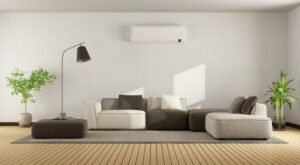 Spring is here, with summer not too far behind. If you were considering replacing your aging air conditioner, we have a great option for you—a ductless air conditioner!
Spring is here, with summer not too far behind. If you were considering replacing your aging air conditioner, we have a great option for you—a ductless air conditioner! When our customers hear the term indoor air quality, they usually consider the temperature of their air. This is an important part of indoor air quality, but not the end of the story. The air quality of your home is impacted by a number of factors—how humid or dry it is, how stale the air is, and the number of allergens in the air, for example. Without the right IAQ products and services in place, your indoor air quality can actually be far worse than the quality of the air outside.
When our customers hear the term indoor air quality, they usually consider the temperature of their air. This is an important part of indoor air quality, but not the end of the story. The air quality of your home is impacted by a number of factors—how humid or dry it is, how stale the air is, and the number of allergens in the air, for example. Without the right IAQ products and services in place, your indoor air quality can actually be far worse than the quality of the air outside. Throughout the lifespan of your heater, there are certain noises that come from it that are easy to “tune out.” For instance, if you live on a busy street, you get used to the noise of cars zipping by, right? The same concept applies to the gentle rattling of your ducts when your furnace turns on or the whoosh of air coming through the room vents. If there’s ever a heater noise you can’t tune out though, because it’s loud or very unusual, then it’s definitely not a noise you should ignore.
Throughout the lifespan of your heater, there are certain noises that come from it that are easy to “tune out.” For instance, if you live on a busy street, you get used to the noise of cars zipping by, right? The same concept applies to the gentle rattling of your ducts when your furnace turns on or the whoosh of air coming through the room vents. If there’s ever a heater noise you can’t tune out though, because it’s loud or very unusual, then it’s definitely not a noise you should ignore.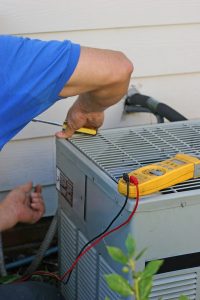 The best way to prepare for the starting of a heating or cooling season is by scheduling annual preventive maintenance. With the official end of summer just a couple short weeks away, it’s just about time to think about scheduling heating maintenance. Having your HVAC systems tuned-up right before you’ll need them the most is a great strategy!
The best way to prepare for the starting of a heating or cooling season is by scheduling annual preventive maintenance. With the official end of summer just a couple short weeks away, it’s just about time to think about scheduling heating maintenance. Having your HVAC systems tuned-up right before you’ll need them the most is a great strategy!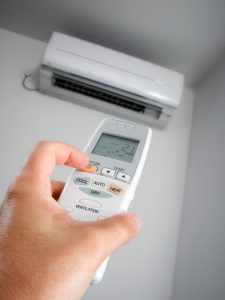 Using a ductless system to cool (and heat) the home has become a popular option for many individuals throughout Rockland and Bergen County, and for good reason! These systems operate on heat pump technology, which gives them that functionality to both cool and heat the home. They use heat transfer rather than heat generation during the winter, making them similar in setup to the traditional central air conditioner—and making them more efficient than a standard central AC or central furnace.
Using a ductless system to cool (and heat) the home has become a popular option for many individuals throughout Rockland and Bergen County, and for good reason! These systems operate on heat pump technology, which gives them that functionality to both cool and heat the home. They use heat transfer rather than heat generation during the winter, making them similar in setup to the traditional central air conditioner—and making them more efficient than a standard central AC or central furnace.